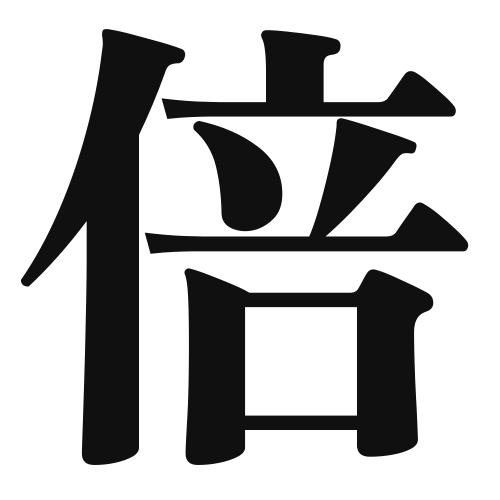1. Overview of Meaning
The kanji “倍” (bai) means “double” or “times” in English. It is used to indicate a quantity that is two times greater than another quantity.
2. Formation and Radical
Formation of the Kanji: The kanji “倍” is a phonetic-ideographic character (形声文字). It combines the radical for “double” (二) and a phonetic component that suggests its pronunciation.
Radical: The radical of “倍” is “二,” which means “two.” This reflects the concept of doubling or multiplying by two.
3. Examples of Usage
Common Words and Phrases: Some frequently used words that include “倍” are:
- 倍数 (baisuu) – multiple
- 倍増 (baizou) – doubling, increase
Example Sentences in Daily Conversation:
- この商品は今、値段が倍になっています。 (Kono shouhin wa ima, nedan ga bai ni natteimasu.) – This product’s price has doubled now.
- 彼の成績は去年の倍です。 (Kare no seiseki wa kyonen no bai desu.) – His grades are double what they were last year.
4. Synonyms and Antonyms
Similar Kanji: A similar kanji is “重” (juu), which means “heavy” or “to weigh.” While “倍” refers to doubling, “重” can imply a sense of weight or heaviness, which is a different context.
Antonyms: An antonym of “倍” is “半” (han), which means “half.” This indicates a reduction to half the original quantity, contrasting with the idea of doubling.
5. Cultural and Historical Background
Relation to Japanese Culture: The concept of doubling is significant in various aspects of Japanese culture, including festivals and celebrations where doubling fortunes or blessings is desired.
Proverbs and Idioms: One common saying is “二倍の努力” (nibai no doryoku), meaning “double the effort,” which emphasizes the importance of putting in extra effort to achieve success.
